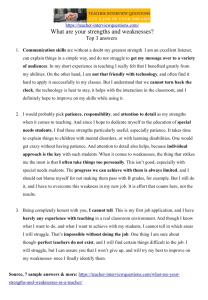Perfect teachers do not exist. And the same is true about interviewers, especially at schools. Because true professional would never ask you about your strengths and weaknesses in an interview.
Such people have the skill to assess your abilities. Listening to you, and observing how you conduct yourself in your teaching job interview, they make their own picture of your strengths. But you should realize that school principals, superintendents, veteran teachers and other professionals from the interviewing panel are not professional interviewers. Hence they may use questions that are a bit outdated nowadays, and belong more to the interviews of early 2000s. Question about strengths and weaknesses definitely fits this description.
Anyway, you may face this question, and you should prepare for it in advance, just as you should for all other tricky teacher interview questions. Let me show you seven sample answers before digging deeper into what you should focus on, and what matters the most while you try to convince the hiring committee of your readiness for the teaching job. I tried to include some unconventional answers on my list, with a sole aim to make you think, and perhaps eventually come up with your own answer, one that will help you stand out and outclass your competitors.
7 sample answers to “What are your strengths and weaknesses” question in a teacher job interview
- Communication skills are without a doubt my greatest strength. I am an excellent listener, can explain things in a simple way, and do not struggle to get my message over to a variety of audiences. In my short experience in teaching I really felt that I benefited greatly from my abilities. On the other hand, I am not that friendly with technology, and often find it hard to apply it successfully in my classes. But I understand that we cannot turn back the clock, the technology is hear to stay, it helps with the interaction in the classroom, and I definitely hope to improve on my skills while using it.
- I would probably pick patience, responsibility, and attention to detail as my strengths when it comes to teaching. And since I hope to dedicate myself to the education of special needs students, I find these strengths particularly useful, especially patience. It takes time to explain things to children with mental disorders, or with learning disabilities. One would get crazy without having patience. And attention to detail also helps, because individual approach is the key with such students. When it comes to weaknesses, the thing that strikes me the most is that I often take things too personally. This isn’t good, especially with special needs students. The progress we can achieve with them is always limited, and I should not blame myself for not making them pass with B grades, for example. But I still do it, and I have to overcome this weakness in my new job. It is effort that counts here, not the results.
- Lack of experience is definitely my greatest weakness. I mean, you can be the best student in your class, read literature outside of curriculum, take parts in seminars, and simply do all you can to get ready for your teaching career. And I’ve done all these things, and more. Still, unless you are in the classroom and face the challenges, you do not know how well will you handle them. So I lack the experience, and this is definitely my weakness, for example when you compare me to other job candidates. On the other hand, I am as motivated as anybody to make something big happen here, to make a positive difference in the life of your students, and simply to be the best teacher I can be.
Special Tip: This isn’t the only tricky question you will face in your interview. You will face questions about conflicts with students, dealing with disciplinary issues, and other tricky situations you may face in the classroom. If you want to make sure you won’t answer such questions with embarrassing silence, have a look at the latest edition of our eBook, the Teacher Interview Guide. Premium answers to all questions you can possibly face in your job interview will help you gain confidence, outclass your competitors, and get the job. Thank you for checking it out!
- I would say that my knowledge of a variety of teaching methods and classroom management strategies is my strength. I’ve been teaching for a while now, and except of one class, I’ve always found a way to make the students engaged in the lessons, and to keep the discipline at a reasonable level at least. As you know for sure from your teaching experience, this isn’t an easy goal to achieve at a secondary school. When it comes to weaknesses, I definitely need to improve on my cooperation with school counselors and other professionals. Running high on confidence, I often try to solve problems myself, including problems that are meant for a psychologist or a counselor to handle. And I know this isn’t good, and hope to improve on this weakness while working at your school, cooperating more with these guys.
- Being completely honest with you, I cannot tell. This is my first job application, and I have barely any experience with teaching in a real classroom environment. And though I know what I want to do, and what I want to achieve with my students, I cannot tell in which areas I will struggle. That’s impossible without doing the job. One thing I am sure about though–perfect teachers do not exist, and I will find certain things difficult in the job. I will struggle, but I can assure you that I won’t give up, and will try my best to improve on my weaknesses–once I finally identify them.
- Experience is my greatest strength. I’ve been teaching for eighteen years now. Different levels of education, private school, public school, you name it. Of course one can learn a lot while studying, but nothing beats real experience from the classroom. And as you can see on my resume, I’ve achieved good results with my students, beating local and regional averages everywhere I taught. I feel ready to help you tackle the challenges you face here, and my experience will help me a great deal. On the other hand, and this is something I am well aware of, I should be more receptive to feedback from both fellow teachers and students. When you teach for long and achieve good results you can easily become complacent. When it happens, you stop improving, and do not reflect on new trends in education. It has happened to me before, and I am prone to such a mistake again. But I am eager to make sure it won’t happen at your school.
- Speaking honestly, it would be better to ask the question my former students and colleagues. Because how I see myself as a teacher, and as a person, is always subjective. Only they can say in what I’ve excelled, and in what I’ve struggled. From my perspective, I am never satisfied. I always try to do better, deliver more, come up with new ideas, make the lessons more engaging. That’s my attitude to teaching and life as well. Thinking about it now, maybe it is also my greatest strength….
Anything you say, ensure them that you aren’t complacent with the status quo
As you can see on my list of answers to “What are your strengths and weaknesses” interview question, you have many options when it comes to answering it. But all of them have one thing in common–you should strive for improvement, regardless of where you stay at the moment with your teaching skills and other abilities. That’s the attitude the interviewers are looking for.
Maybe you excel in this, and struggle with that. And maybe such things have an impact on your results in the classroom. All of it is fine, as long as you are aware of your weaknesses, and have an honest desire to better yourself down the road, to become the best teacher you can be. This is what they want to hear from you before anything else. And a bit of humility is always welcome in the interviews…

Special tip no. 2: Download TOP 3 answers in a simple, one page long PDF, print it, and practice your perfect answer anytime later, for example right before the start of your interview:

Not sure what to say? Experience, or lack of it, is always a good answer
If you struggle to formulate your answer, or are afraid that you will forget what you prepared, in the heat of the moment and stress of the interviews, you can always fall back on your teaching experience. Because each of us either lacks it, or have it in abundance. First one is a weakness, second one a strength, and you can always refer to it when struggling to come up with anything better.
Just do not forget that ten years teaching somewhere do not necessarily make from you a better teacher. You should add something tangible to such an answer. Perhaps you helped your students to achieve above-average results (comparing to previous years under other teacher, or to national averages), or you even led someone to a victory in some big competition (Math, Literacy, Sports, anything). Or at least you can narrate some challenges you’ve faced over the years, and how dealing with them helped you to become who you are now, and will make it easier for you while facing those challenges again.
Do not be afraid to say something unconventional
At the end of the day, your goal is to stand out in your teaching interview, especially when competing with other people for the job. Saying what everyone else says will not help you to achieve this goal… Of course, if you are the only candidate, you can get for a safe answer, such as praising your communication skills, and saying that you need to improve on something else (check sample answers for ideas).
When competing with many others, however, which can be the case with better paid teaching jobs and prestigious schools, your best bet can be saying something unconventional. For example that you cannot tell (and explaining why, see sample answer no. 5), or referring to a specific group of students, such as students with special needs (check answer no. 2 on the list), or even saying that you are never satisfied, and hence cannot name any strengths (sample answer no. 7).
I do not say that such answers are always your best bet. But you can be sure that most (if not all) applicants will say something else, opting for more conventional answers, and hence you will stand out with this one…
Ready to answer the question about your weaknesses and strengths? I hope so! Check also 7 sample answers to other tricky teacher interview questions:
- Why should we hire you, and not one of the other applicants?
- How do you keep students engaged and motivated?
- Teacher Interview Guide eBook – Premium answers to all questions.
